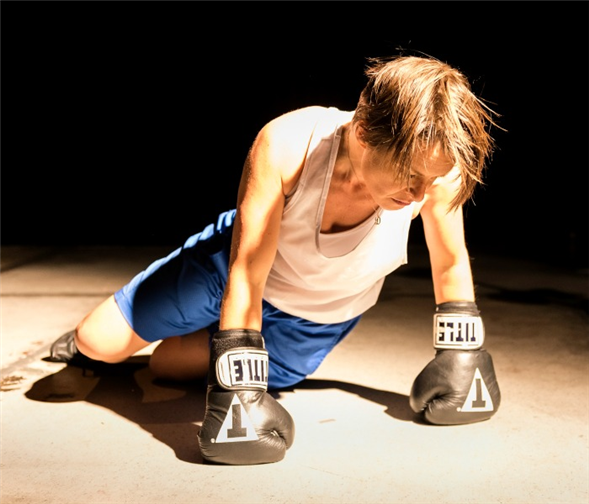Translate Page

The Wholehearted attacks tough questions at Abrons Arts Center
---
Ironically, there's something comforting about procedural crime dramas because we know how they will go. Female victim endures a violent, often sexual attack. If she survives, we see her crying and shaking in an interview with the cops. If she doesn't, we see her naked body brutalized. The details and the circumstances change, but the central narrative remains the same. "The viewer doesn't have to question anything," says Suli Holum, the co-director and star of The Wholehearted, which explores the nature of violence. Holum points out that by normalizing abuse against women, TV shows such as Law & Order: Special Victims Unit end up reinforcing the very thing they are theoretically against. And that's a big reason why she and writer/co-director Deborah Stein decided to embark on this gut-punching, multimedia revenge tragedy about a battered wife.
Originally commissioned and developed by ArtsEmerson in Boston in 2014, The Wholehearted has toured the country and is making its New York debut at Abrons Arts Center this month. In the hour-long drama, former championship boxer Dee Crosby discovers her abusive husband is getting out of prison and she sets her sights on payback, thus perpetuating a cycle. "Our partnership is about tackling stuff we don't know how to make a play about," Holum says about her work with Stein, which includes the 2012 Under the Radar hit Chimera. "Our collaboration is about getting into an argument or debate around heady things and then coming through that conversation understanding opposing points of view. So the piece really sits in questions: What is it to really try and understand violence? Why does violence become the option?"
In the solo show, Holum plays three characters: Dee, her estranged spouse Charlie, and Carmen, Dee's high-school crush. As part of their developmental research, Holum and Stein conferred with social workers who challenged their notions of love and violence. "The definition of love is subjective," says Holum. "And love is what you are taught love is. So often stories of survival are about people who move past a trauma. But that's not really how it happens. You can move out of violent circumstances, but they will be with you forever."
Dee's marital problems juxtaposed against her prizefighting career allowed Holum and Stein to examine violence in different contexts. "We wanted to look at violent sports, which are acceptable forms of entertainment, alongside domestic violence, which is unacceptable," Holum explains. Additional inspiration came from disparate places, which is why the performance features live video and even singing. "We were interested in sports memoirs and acts of self-portraiture, so we looked at portraits by Francesca Woodman and Cindy Sherman. The final nugget was music and thinking about murder ballads -- why is that a thing? Why is that OK?"
Holum, who learned how to box for the show, says that "the performance is, in so many ways, a dare for me. As a dancer I had been trained to make the least amount of impact with my body on any surface. I've had to restructure how my body moves through space." Then she chuckles, realizing that what she's just described is an apt metaphor for the way women have been emboldened by the #MeToo movement. "It's been fascinating to work on this show over time and have the context shift around us and to feel that in the work," she says. "We're in a moment where people seem to be embracing feeling unsettled as a core value. I'm curious what the conversation will be like around this piece now."
---
Eliza Bent is a playwright, performer, and sometime pundit. Follow her on Instagram at @getbentobox. Follow TDF on Instagram at @officialtdf.
Top image: Suli Holum in The Wholehearted. Photos ©2016 Craig Schwartz CTG Presentation.
TDF MEMBERS: Go here to browse our latest discounts for dance, theatre, and concerts.